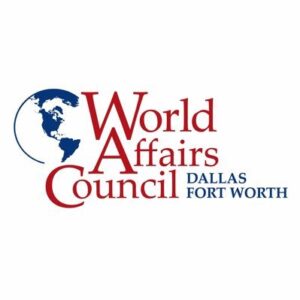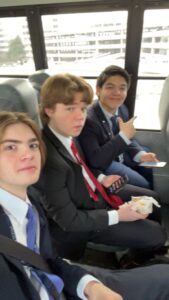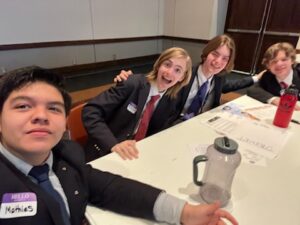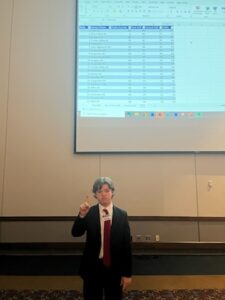On February 21, 2024, the Jesuit J.W.A.C. (Junior World Affairs Council) competed in its first competition of 2024, the Dallas Area Academic World Quest. Jesuit’s team competed against 95 other teams from schools all over the Dallas area, all in the hopes of winning and going to nationals in Washington D.C. Also, the Jesuit J.W.A.C. team was pleasantly surprised when they got 18th place, especially since this was their first time participating in a competition of this magnitude. However, I am sure plenty of you have never even heard of JWAC or Academic World Quest, so here are the basics.
What is J.W.A.C. (Junior World Affairs Council)?
J.W.A.C. is a student-run organization that focuses on educating young people about global issues, international relations, and diplomacy. J.W.A.C. chapters typically operate within schools or communities and offer students opportunities to engage in discussions, debates, and activities related to world affairs. J.W.A.C. hosts many events all across the year for students to participate in, all in the hopes of better understanding a particular aspect of the community. An example of a J.W.A.C. event hosted in Dallas last year would be visiting the ambassador of Belgium at a special lunch.
This event gave students the opportunity to converse and ask many questions to the ambassador, learning about insightful experiences and stories along the way. There are also so many more events that students can participate in from listening to guest speakers, attending Model United Nations (U.N.) simulations, experiencing cultural exchange events, and participating in community service projects. These activities aimed to broaden students’ perspectives, foster critical thinking skills, and promote global citizenship.

Academic World Quest: A General Overview
The annual Academic World Quest Competition, hosted at U.T. Arlington, is a flagship education program of the World Affairs Councils of America (W.A.C.A.), the parent group of J.W.A.C., designed to engage high school students in global affairs. It typically takes the form of a quiz competition that tests participants’ knowledge of international relations, geography, history, culture, and current events. Here’s how it generally works:
First, there are teams of four people, represented by a wide variety of schools in the area. Jesuit’s team consisted of Mathias Espinoza 26′, Adam Peckham 26′, Wills Blosser 26′, and Nicholas Bartel 27′. Also, there can be multiple teams per school; for example, Ursuline had four teams. Next, the competition consists of multiple rounds of questions covering a wide range of topics related to global affairs. Questions can include current events, historical events, geography, international organizations, cultural practices, and more.
In Jesuit’s case, there were ten rounds of ten questions that had specific categories. These categories included: A History of N.A.T.O., Defense in a Changing World, The Global South, Sports and Diplomacy, Country in Focus: South Korea, Promoting a Green Europe, Women’s Contributions to Track II Diplomacy, Navigating A.I.: The Global Workforce, Great Decisions, and finally, Current Events. The format of Academic World Quest can vary, but it usually involves a series of timed rounds where teams answer questions individually or collaboratively. There may be multiple choice questions, short answer questions, and sometimes essay or discussion rounds. For Jesuit, they all had multiple choice questions and answered as a group, serving as a relief to many. The event lasted from 8:45a.m. to 1:45p.m.

Recap of the Competition with Wills Blosser ’26
The following is an interview with contestant Wills Blosser, answering a series of questions about his experience at the competition. Questions were asked to other members of Jesuit J.W.A.C. as well. Questions were asked by Adam Peckham 26′.
Adam Peckham (Interviewer): So, I am sure a lot of people at Jesuit have no idea that the J.W.A.C. club existed. So, tell me, how did it come to form? Who made it all possible? Is it a new or old club?
Wills Blosser (Interviewee): Well, J.W.A.C. was founded by Alec Tison ’24 last year with the support of Mrs. Hudec. It was a one-man club with him as the founder. However this year, members of Model U.N., like myself, were introduced to it by Mrs. Hudec who was the moderator for both J.W.A.C. and Model U.N. And many of us in Model U.N. quickly joined because it appealed to our desire to participate in many events related to diplomacy and politics. And, since then with the great support of Mrs. Hudec, the club has grown and we are now participating in full-fledge competitions.
Adam: Interesting, so the club was relatively quiet until it got the support of Model U.N., and this competition was the club’s debut, in a way?
Wills: Yes, I think that sums it up pretty well.
Adam: Moving on, why did you choose this competition specifically to make your debut and not another event? Was that always the plan?
Wills: To be completely honest, this competition was not part of any larger plan, we kind of just did it on a whim. And, I heavily supported this motion saying it would be a great way to get acclimated to what J.W.A.C. is all about, putting us in the “deep end” immediately. So “on a whim” basically means we decided we were going to go one week in advance, which I know is questionable. But, we assembled a team consisting of myself, Adam Peckham, Mathias Espinoza, and Nick Bartel. And in such short notice, we still got Mrs. Hudec’s and the school’s approval!
Adam: How did you prepare for such a big competition in such a short amount of time?
Wills: Well, it was a grind to say the least. But luckily, there were sample questions from all the categories that would be asked about at the competition. So, the for the next week before the competition we took time out of our day to frantically practice the questions and study the categories to be adequately prepared.
Adam: Gosh, that sounds pretty miserable, but definitely a wise decision. So, how did your competition day begin?
Wills: So, we were supposed to arrive at Jesuit at 7:30a.m. to take a bus to U.T. Arlington where the competition was to be held. But, you know, one of our members forgot, and it was a scramble. But, they soon arrived in time and we departed.
On the bus, we studied vigorously, going over all the review packets one more time over, getting motion sick in the process. And after like a 30-minute drive, we arrived to the university where we saw the other 96 teams of four people and all the club moderators gathered in the lobby.
We were taken aback by the all the schools there, seeing some recognizable ones too including Cistercian, Ursuline, Greenhill, and many many more. Ursuline, as a matter of fact, had four teams of four people, some of which I knew actually and we spent some time talking to them. And, having more time to kill, we once again began studying like crazy before the competition would start.

Adam: It sounds like quite the eventful morning! It’s impressive that despite the initial hiccup, your team managed to pull through and make it on time. Now, I’d like to hear about the competition itself and how it played out.
Wills: Well, yeah of course. So, at 8:45 we were invited into a massive assembly room where all the teams were seated, and because we signed up at the last minute (literally), we were seated at the 96th table in the far corner. It was quite hilarious just how large the room was and just how much activity was taking place.
So, after the head moderator had to make several attempts to quiet all of us down, we went over the rules and prepared for round one. And funny enough, that is when we learned that the winner of this competition gets to go to Nationals and compete at Georgetown University in Washington D.C.! So, learning this exciting news, and with even more eager anticipation, we began. So, we quickly learned we had ten seconds to answer a multiple choice question with four answer questions on a massive projector.
The first category was a History of N.A.T.O., and the questions were surprisingly doable and we knew for the most part what to answer because of our last minute studying. And as time went on, we quickly developed a rhythm of how to answer the questions efficiently.

Adam: It sounds like the competition got off to an exciting start! Being seated at the 96th table must have given you quite the perspective on just how grand the event was. As the competition kicked off with round one, it must have been quite the adrenaline rush. Can you describe the dynamics of answering questions under the pressure of a ticking clock?
Wills: Okay, sure. So yes, knowing that the stakes were now pretty high and with the opportunity to compete at Nationals on the line, it added an extra dose of motivation. And yeah, the adrenaline was definitely pumping as we dove into each question. With only ten seconds to answer, there was no time to second-guess ourselves. It was all about quick thinking and trusting our instincts. Yes, there was also a lot of arguing when we did not agree on the same answer choice, but we were able to come up with decisions regardless. And, we eventually got into a rhythm of talking it out with one another and making important decisions on the fly.
Adam: It’s pretty cool how the pressure of competition can bring out both the intensity and the camaraderie among teammates. Especially in the case of those moments of disagreement, where you had to quickly resolve differences and make split-second decisions. Moving on, how did other teams respond to the stress? Where there any opportunities to slow down? Take a break?
Wills: So, the other teams around us were just as intense and focused as we were, immediately after the question had been asked, the room exploded with conversation and discussion. And no, we did not try to listen in on the other teams, that would not be the greatest decision. And we honestly could not even comprehend what the other teams were saying because we were so focused ourselves.
To answer your other question, yes there were little five-minute windows between rounds where we could rest, and they also had a random history/geography question that was asked and whichever table raised their hands first and got it right would win a book.
I honestly do not know what the books were specifically because our team was in the far corner and the people asking the questions could not really see our hands waving (we actually knew some of them). After five rounds, we eventually also had a thirty-minute lunch where we got some pizza.
Adam: It sounds like the atmosphere was electric with everyone fully immersed in the intensity of the competition. It’s fascinating how each team created this bubble of focus and determination, shutting out the distractions around them to give their all to each question. Those little windows of rest between rounds must have been much needed opportunities to recharge and regroup. Now, I am curious, after all ten rounds, what happened next?
Wills: So, after the final round, we had another break where we were discussing how we thought we did. And to be honest, we were kind of nervous because there were so many teams that we had no idea what level they played at and we felt subconscious about whether or not we did good or not. So, we then got called back in, and an announcer went through every single answer. So for the next 30 minutes, loud cheers and sighs of disappointment erupted across the room. And in the end, the scores were tallied and we got 18th place. When we found out, we were actually really happy for we thought we did pretty terrible in all honesty. We also found out we beat three out of the four Cistercian teams, so that was pretty nice.

Adam: Wow, I guess the dedication and focus you exhibited in those frantic practice sessions absolutely played a crucial role in your performance during the competition. I mean, one week of studying getting that far is pretty incredible if you ask me. Does this competition occur annually? And if so, will you participate again?
Wills: Yes, this competition happens once a year and we will definitely be competing again next year. And next time, we will study far in advance in hopes of getting 1st place. We also want to bring more than one team next year, and there have already been expressed interests by others to do so.
Conclusion
Overall, this competition was a great way to initiate Jesuit into J.W.A.C. and all it has to offer, learning a great many things along the way. With the hopes of competing next year, Jesuit aims to get to the Academic World Quest nationals and participate in other J.W.A.C. events along the way. On behalf of Jesuit J.W.A.C., thank you for reading!
Stay tuned to The Roundup for more school and club news! Go Rangers!
